International Finance: Ethical Standards, Risks & Agency Issues
VerifiedAdded on 2022/09/09
|9
|1795
|19
Homework Assignment
AI Summary
This assignment delves into various aspects of international finance, starting with a discussion on whether multinational corporations (MNCs) should reduce their ethical standards to compete internationally, arguing against it by emphasizing the importance of maintaining global standards and ethical conduct. It then explores the role of joint ventures in wealth maximization, using Anheuser-Busch as an example, and examines how joint ventures limit international business risks. The assignment further analyzes the Greek credit crisis and its impact on the Eurozone, highlighting the lack of fiscal discipline enforcement mechanisms. It discusses the fundamental factors affecting interest rates in different countries and advises on the timing of Initial Public Offerings (IPOs) based on market conditions. The solution also covers hedging strategies for entrepreneurs to protect against currency risks and the impact of exchange rate uncertainty on Foreign Direct Investment (FDI). Finally, it addresses the separation of ownership and management in corporations, agency relationships, and managerial opportunism, emphasizing the importance of internal governance mechanisms.
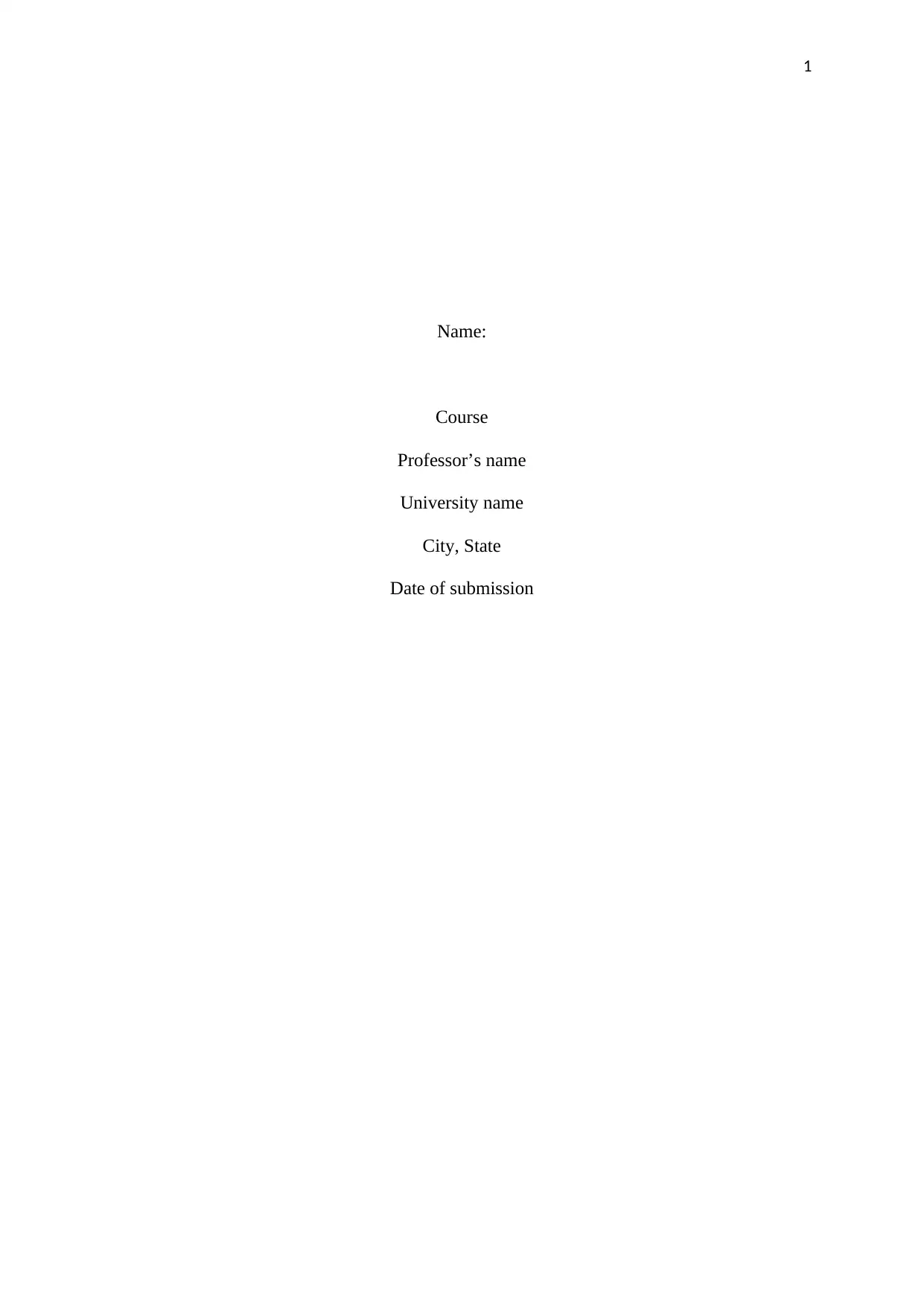
1
Name:
Course
Professor’s name
University name
City, State
Date of submission
Name:
Course
Professor’s name
University name
City, State
Date of submission
Paraphrase This Document
Need a fresh take? Get an instant paraphrase of this document with our AI Paraphraser
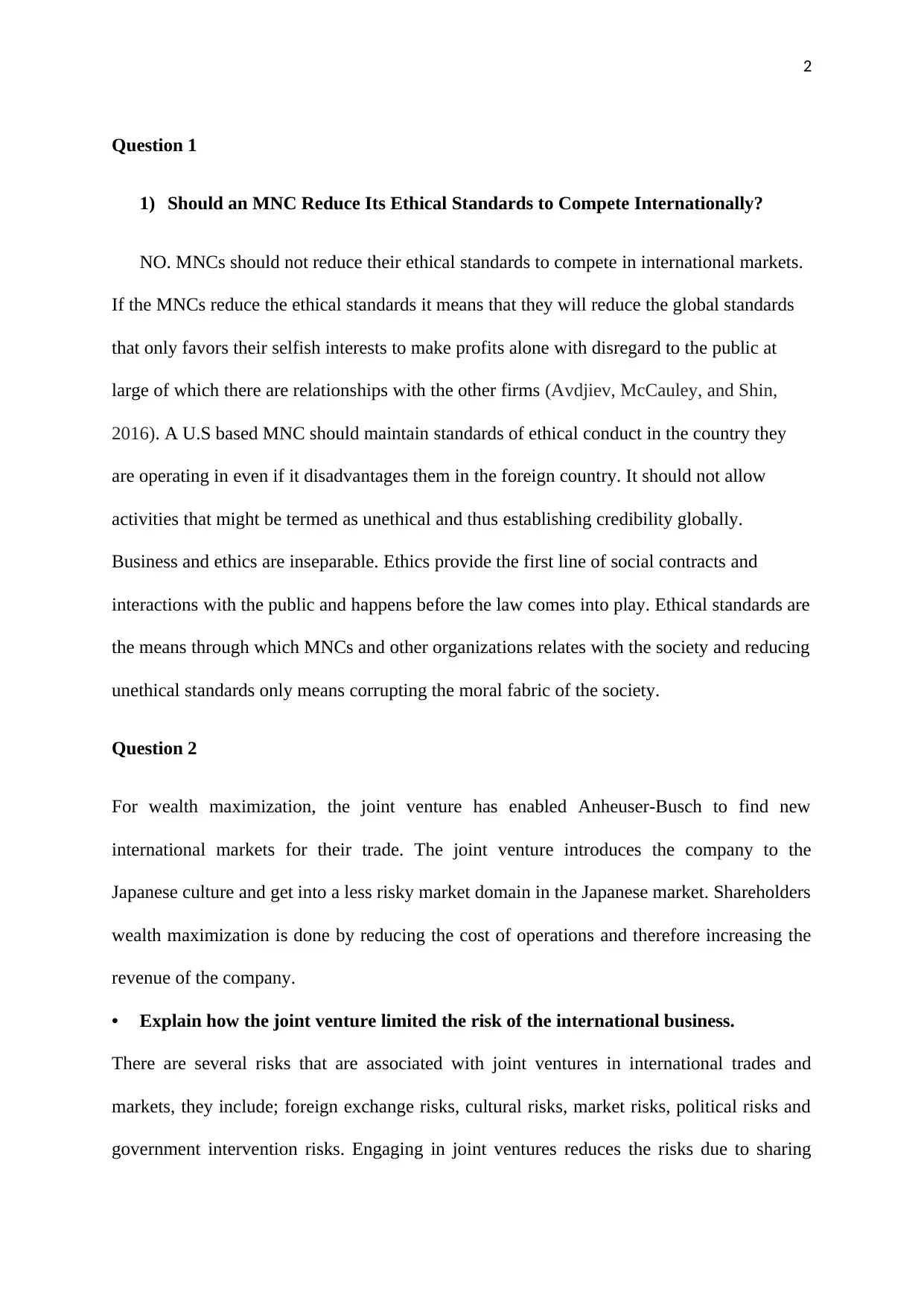
2
Question 1
1) Should an MNC Reduce Its Ethical Standards to Compete Internationally?
NO. MNCs should not reduce their ethical standards to compete in international markets.
If the MNCs reduce the ethical standards it means that they will reduce the global standards
that only favors their selfish interests to make profits alone with disregard to the public at
large of which there are relationships with the other firms (Avdjiev, McCauley, and Shin,
2016). A U.S based MNC should maintain standards of ethical conduct in the country they
are operating in even if it disadvantages them in the foreign country. It should not allow
activities that might be termed as unethical and thus establishing credibility globally.
Business and ethics are inseparable. Ethics provide the first line of social contracts and
interactions with the public and happens before the law comes into play. Ethical standards are
the means through which MNCs and other organizations relates with the society and reducing
unethical standards only means corrupting the moral fabric of the society.
Question 2
For wealth maximization, the joint venture has enabled Anheuser-Busch to find new
international markets for their trade. The joint venture introduces the company to the
Japanese culture and get into a less risky market domain in the Japanese market. Shareholders
wealth maximization is done by reducing the cost of operations and therefore increasing the
revenue of the company.
• Explain how the joint venture limited the risk of the international business.
There are several risks that are associated with joint ventures in international trades and
markets, they include; foreign exchange risks, cultural risks, market risks, political risks and
government intervention risks. Engaging in joint ventures reduces the risks due to sharing
Question 1
1) Should an MNC Reduce Its Ethical Standards to Compete Internationally?
NO. MNCs should not reduce their ethical standards to compete in international markets.
If the MNCs reduce the ethical standards it means that they will reduce the global standards
that only favors their selfish interests to make profits alone with disregard to the public at
large of which there are relationships with the other firms (Avdjiev, McCauley, and Shin,
2016). A U.S based MNC should maintain standards of ethical conduct in the country they
are operating in even if it disadvantages them in the foreign country. It should not allow
activities that might be termed as unethical and thus establishing credibility globally.
Business and ethics are inseparable. Ethics provide the first line of social contracts and
interactions with the public and happens before the law comes into play. Ethical standards are
the means through which MNCs and other organizations relates with the society and reducing
unethical standards only means corrupting the moral fabric of the society.
Question 2
For wealth maximization, the joint venture has enabled Anheuser-Busch to find new
international markets for their trade. The joint venture introduces the company to the
Japanese culture and get into a less risky market domain in the Japanese market. Shareholders
wealth maximization is done by reducing the cost of operations and therefore increasing the
revenue of the company.
• Explain how the joint venture limited the risk of the international business.
There are several risks that are associated with joint ventures in international trades and
markets, they include; foreign exchange risks, cultural risks, market risks, political risks and
government intervention risks. Engaging in joint ventures reduces the risks due to sharing
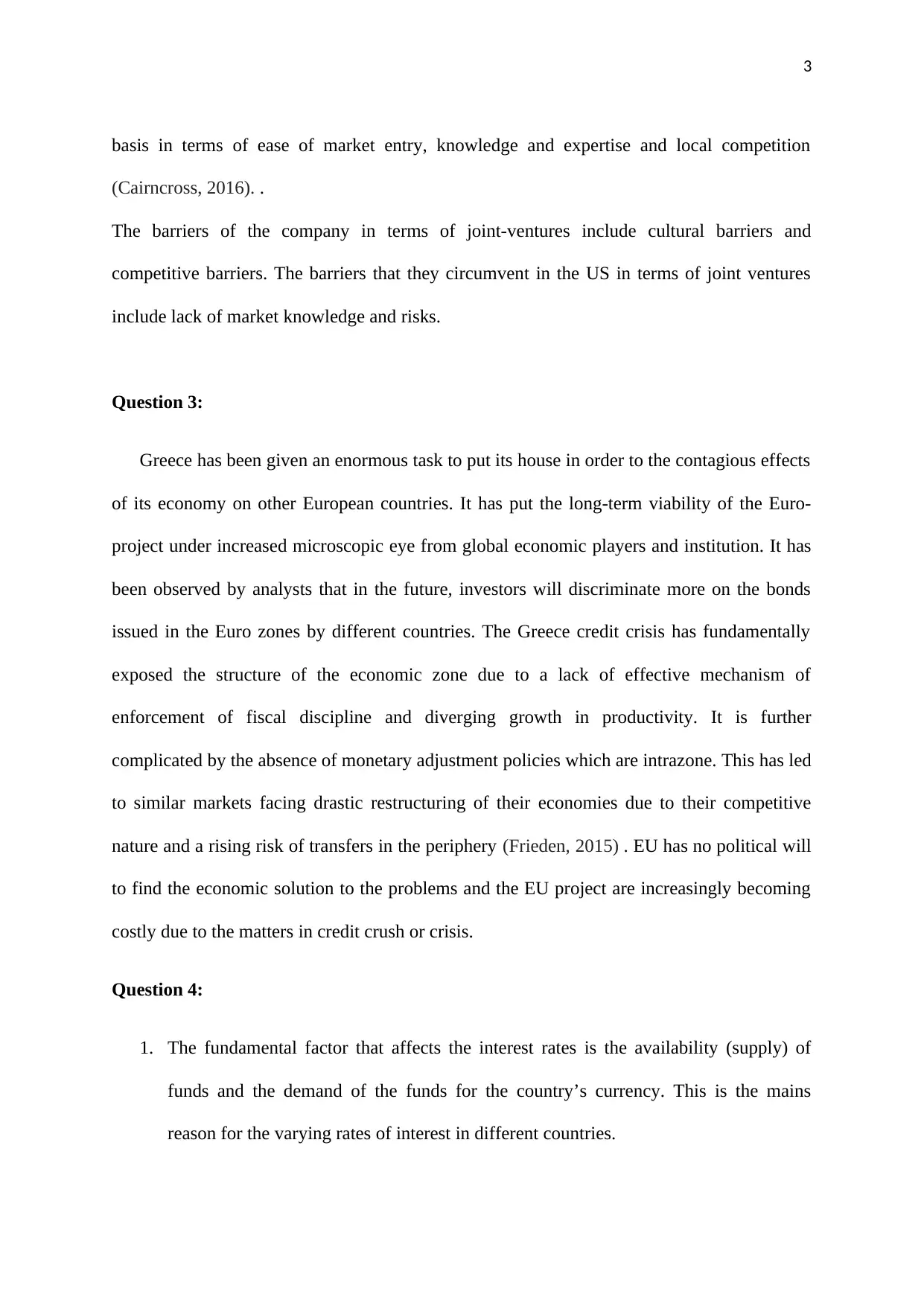
3
basis in terms of ease of market entry, knowledge and expertise and local competition
(Cairncross, 2016). .
The barriers of the company in terms of joint-ventures include cultural barriers and
competitive barriers. The barriers that they circumvent in the US in terms of joint ventures
include lack of market knowledge and risks.
Question 3:
Greece has been given an enormous task to put its house in order to the contagious effects
of its economy on other European countries. It has put the long-term viability of the Euro-
project under increased microscopic eye from global economic players and institution. It has
been observed by analysts that in the future, investors will discriminate more on the bonds
issued in the Euro zones by different countries. The Greece credit crisis has fundamentally
exposed the structure of the economic zone due to a lack of effective mechanism of
enforcement of fiscal discipline and diverging growth in productivity. It is further
complicated by the absence of monetary adjustment policies which are intrazone. This has led
to similar markets facing drastic restructuring of their economies due to their competitive
nature and a rising risk of transfers in the periphery (Frieden, 2015) . EU has no political will
to find the economic solution to the problems and the EU project are increasingly becoming
costly due to the matters in credit crush or crisis.
Question 4:
1. The fundamental factor that affects the interest rates is the availability (supply) of
funds and the demand of the funds for the country’s currency. This is the mains
reason for the varying rates of interest in different countries.
basis in terms of ease of market entry, knowledge and expertise and local competition
(Cairncross, 2016). .
The barriers of the company in terms of joint-ventures include cultural barriers and
competitive barriers. The barriers that they circumvent in the US in terms of joint ventures
include lack of market knowledge and risks.
Question 3:
Greece has been given an enormous task to put its house in order to the contagious effects
of its economy on other European countries. It has put the long-term viability of the Euro-
project under increased microscopic eye from global economic players and institution. It has
been observed by analysts that in the future, investors will discriminate more on the bonds
issued in the Euro zones by different countries. The Greece credit crisis has fundamentally
exposed the structure of the economic zone due to a lack of effective mechanism of
enforcement of fiscal discipline and diverging growth in productivity. It is further
complicated by the absence of monetary adjustment policies which are intrazone. This has led
to similar markets facing drastic restructuring of their economies due to their competitive
nature and a rising risk of transfers in the periphery (Frieden, 2015) . EU has no political will
to find the economic solution to the problems and the EU project are increasingly becoming
costly due to the matters in credit crush or crisis.
Question 4:
1. The fundamental factor that affects the interest rates is the availability (supply) of
funds and the demand of the funds for the country’s currency. This is the mains
reason for the varying rates of interest in different countries.
⊘ This is a preview!⊘
Do you want full access?
Subscribe today to unlock all pages.

Trusted by 1+ million students worldwide
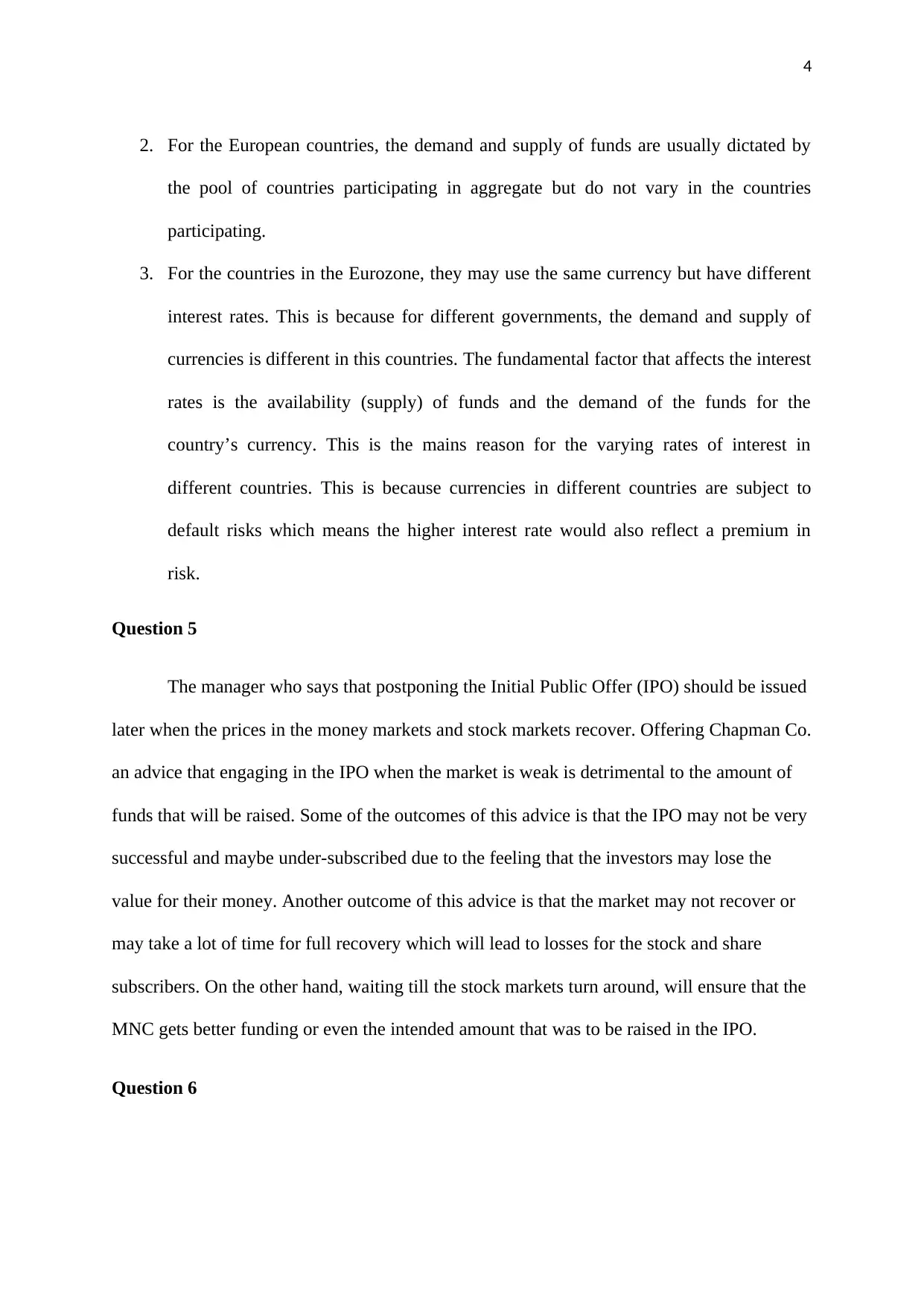
4
2. For the European countries, the demand and supply of funds are usually dictated by
the pool of countries participating in aggregate but do not vary in the countries
participating.
3. For the countries in the Eurozone, they may use the same currency but have different
interest rates. This is because for different governments, the demand and supply of
currencies is different in this countries. The fundamental factor that affects the interest
rates is the availability (supply) of funds and the demand of the funds for the
country’s currency. This is the mains reason for the varying rates of interest in
different countries. This is because currencies in different countries are subject to
default risks which means the higher interest rate would also reflect a premium in
risk.
Question 5
The manager who says that postponing the Initial Public Offer (IPO) should be issued
later when the prices in the money markets and stock markets recover. Offering Chapman Co.
an advice that engaging in the IPO when the market is weak is detrimental to the amount of
funds that will be raised. Some of the outcomes of this advice is that the IPO may not be very
successful and maybe under-subscribed due to the feeling that the investors may lose the
value for their money. Another outcome of this advice is that the market may not recover or
may take a lot of time for full recovery which will lead to losses for the stock and share
subscribers. On the other hand, waiting till the stock markets turn around, will ensure that the
MNC gets better funding or even the intended amount that was to be raised in the IPO.
Question 6
2. For the European countries, the demand and supply of funds are usually dictated by
the pool of countries participating in aggregate but do not vary in the countries
participating.
3. For the countries in the Eurozone, they may use the same currency but have different
interest rates. This is because for different governments, the demand and supply of
currencies is different in this countries. The fundamental factor that affects the interest
rates is the availability (supply) of funds and the demand of the funds for the
country’s currency. This is the mains reason for the varying rates of interest in
different countries. This is because currencies in different countries are subject to
default risks which means the higher interest rate would also reflect a premium in
risk.
Question 5
The manager who says that postponing the Initial Public Offer (IPO) should be issued
later when the prices in the money markets and stock markets recover. Offering Chapman Co.
an advice that engaging in the IPO when the market is weak is detrimental to the amount of
funds that will be raised. Some of the outcomes of this advice is that the IPO may not be very
successful and maybe under-subscribed due to the feeling that the investors may lose the
value for their money. Another outcome of this advice is that the market may not recover or
may take a lot of time for full recovery which will lead to losses for the stock and share
subscribers. On the other hand, waiting till the stock markets turn around, will ensure that the
MNC gets better funding or even the intended amount that was to be raised in the IPO.
Question 6
Paraphrase This Document
Need a fresh take? Get an instant paraphrase of this document with our AI Paraphraser
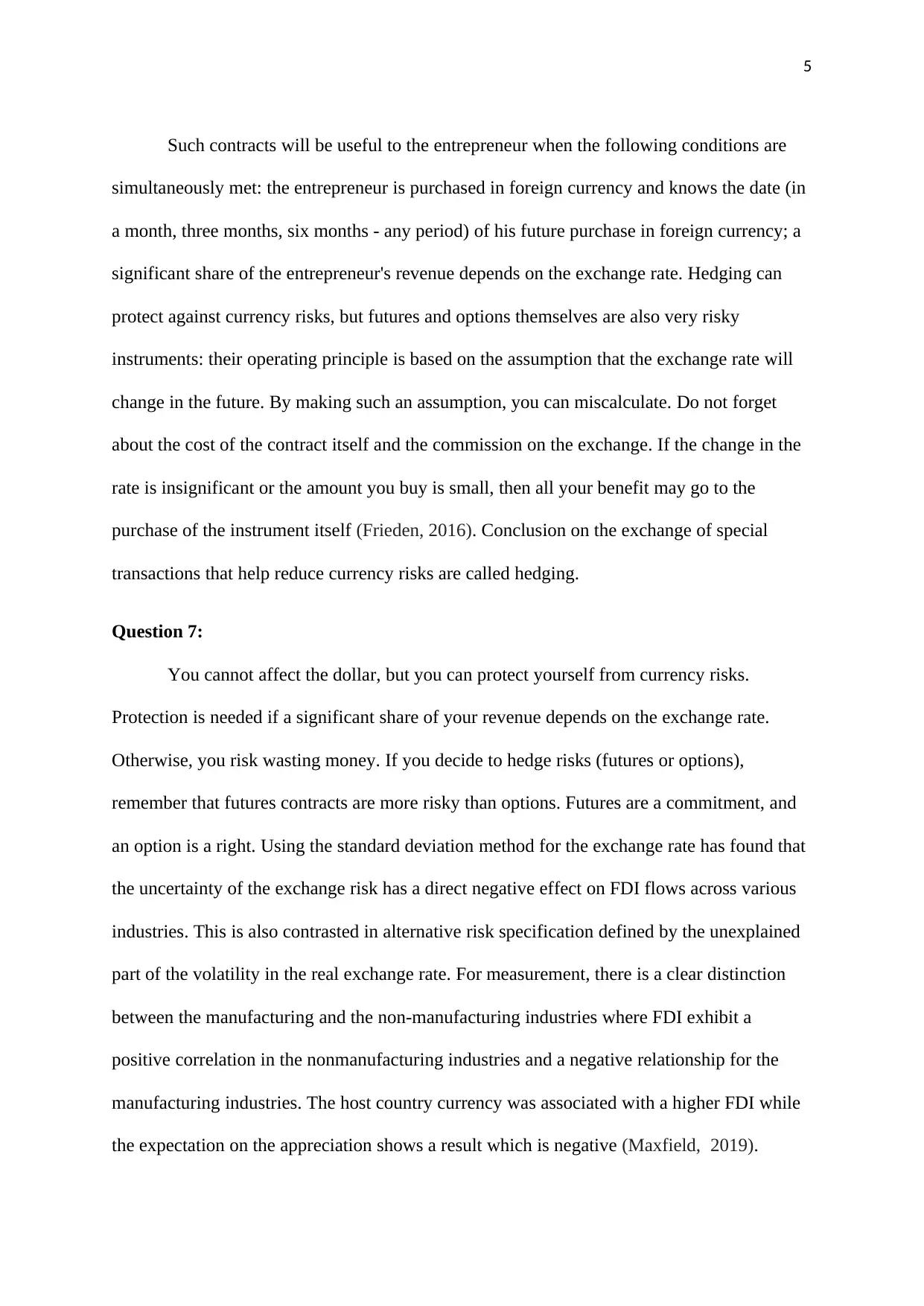
5
Such contracts will be useful to the entrepreneur when the following conditions are
simultaneously met: the entrepreneur is purchased in foreign currency and knows the date (in
a month, three months, six months - any period) of his future purchase in foreign currency; a
significant share of the entrepreneur's revenue depends on the exchange rate. Hedging can
protect against currency risks, but futures and options themselves are also very risky
instruments: their operating principle is based on the assumption that the exchange rate will
change in the future. By making such an assumption, you can miscalculate. Do not forget
about the cost of the contract itself and the commission on the exchange. If the change in the
rate is insignificant or the amount you buy is small, then all your benefit may go to the
purchase of the instrument itself (Frieden, 2016). Conclusion on the exchange of special
transactions that help reduce currency risks are called hedging.
Question 7:
You cannot affect the dollar, but you can protect yourself from currency risks.
Protection is needed if a significant share of your revenue depends on the exchange rate.
Otherwise, you risk wasting money. If you decide to hedge risks (futures or options),
remember that futures contracts are more risky than options. Futures are a commitment, and
an option is a right. Using the standard deviation method for the exchange rate has found that
the uncertainty of the exchange risk has a direct negative effect on FDI flows across various
industries. This is also contrasted in alternative risk specification defined by the unexplained
part of the volatility in the real exchange rate. For measurement, there is a clear distinction
between the manufacturing and the non-manufacturing industries where FDI exhibit a
positive correlation in the nonmanufacturing industries and a negative relationship for the
manufacturing industries. The host country currency was associated with a higher FDI while
the expectation on the appreciation shows a result which is negative (Maxfield, 2019).
Such contracts will be useful to the entrepreneur when the following conditions are
simultaneously met: the entrepreneur is purchased in foreign currency and knows the date (in
a month, three months, six months - any period) of his future purchase in foreign currency; a
significant share of the entrepreneur's revenue depends on the exchange rate. Hedging can
protect against currency risks, but futures and options themselves are also very risky
instruments: their operating principle is based on the assumption that the exchange rate will
change in the future. By making such an assumption, you can miscalculate. Do not forget
about the cost of the contract itself and the commission on the exchange. If the change in the
rate is insignificant or the amount you buy is small, then all your benefit may go to the
purchase of the instrument itself (Frieden, 2016). Conclusion on the exchange of special
transactions that help reduce currency risks are called hedging.
Question 7:
You cannot affect the dollar, but you can protect yourself from currency risks.
Protection is needed if a significant share of your revenue depends on the exchange rate.
Otherwise, you risk wasting money. If you decide to hedge risks (futures or options),
remember that futures contracts are more risky than options. Futures are a commitment, and
an option is a right. Using the standard deviation method for the exchange rate has found that
the uncertainty of the exchange risk has a direct negative effect on FDI flows across various
industries. This is also contrasted in alternative risk specification defined by the unexplained
part of the volatility in the real exchange rate. For measurement, there is a clear distinction
between the manufacturing and the non-manufacturing industries where FDI exhibit a
positive correlation in the nonmanufacturing industries and a negative relationship for the
manufacturing industries. The host country currency was associated with a higher FDI while
the expectation on the appreciation shows a result which is negative (Maxfield, 2019).
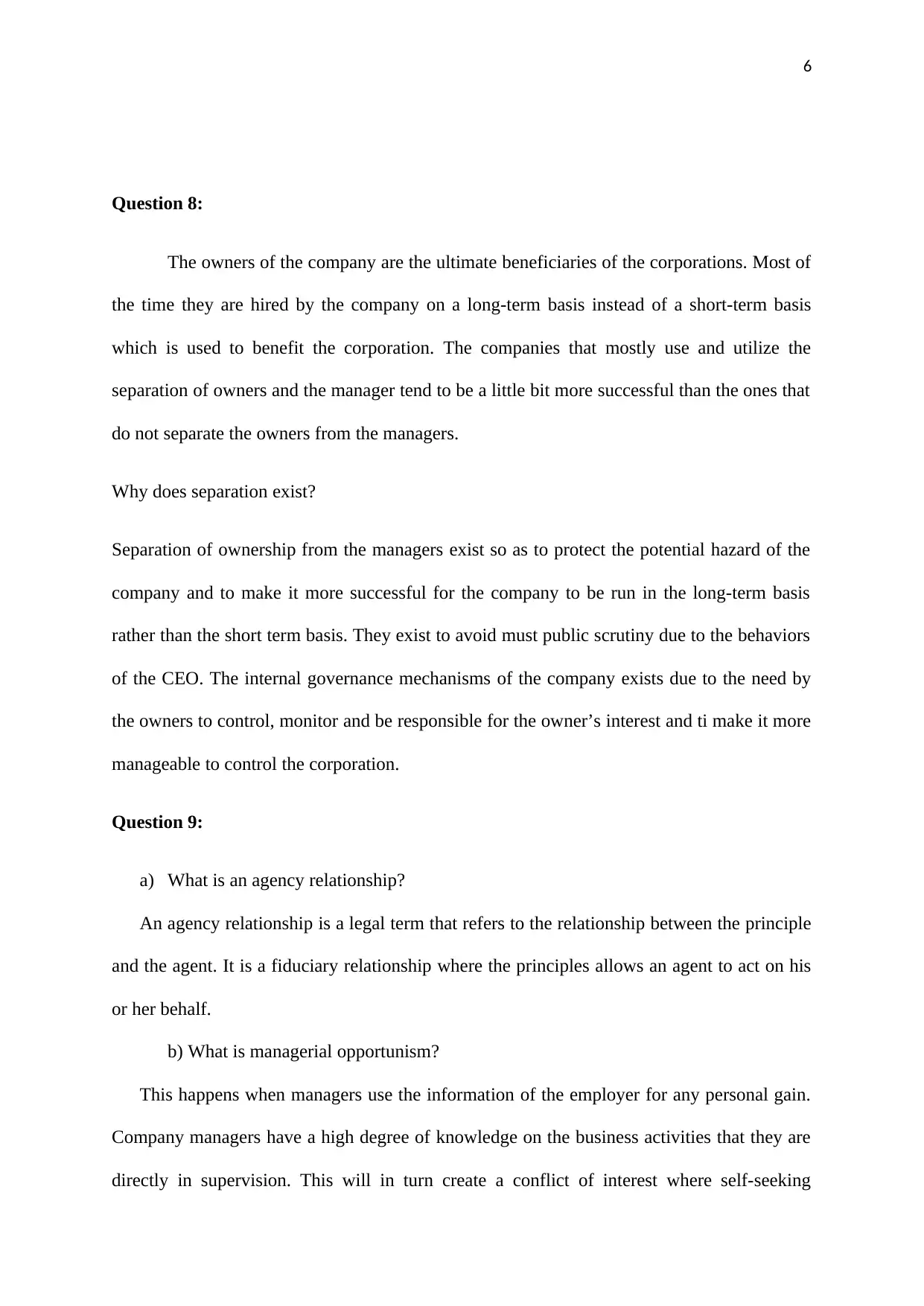
6
Question 8:
The owners of the company are the ultimate beneficiaries of the corporations. Most of
the time they are hired by the company on a long-term basis instead of a short-term basis
which is used to benefit the corporation. The companies that mostly use and utilize the
separation of owners and the manager tend to be a little bit more successful than the ones that
do not separate the owners from the managers.
Why does separation exist?
Separation of ownership from the managers exist so as to protect the potential hazard of the
company and to make it more successful for the company to be run in the long-term basis
rather than the short term basis. They exist to avoid must public scrutiny due to the behaviors
of the CEO. The internal governance mechanisms of the company exists due to the need by
the owners to control, monitor and be responsible for the owner’s interest and ti make it more
manageable to control the corporation.
Question 9:
a) What is an agency relationship?
An agency relationship is a legal term that refers to the relationship between the principle
and the agent. It is a fiduciary relationship where the principles allows an agent to act on his
or her behalf.
b) What is managerial opportunism?
This happens when managers use the information of the employer for any personal gain.
Company managers have a high degree of knowledge on the business activities that they are
directly in supervision. This will in turn create a conflict of interest where self-seeking
Question 8:
The owners of the company are the ultimate beneficiaries of the corporations. Most of
the time they are hired by the company on a long-term basis instead of a short-term basis
which is used to benefit the corporation. The companies that mostly use and utilize the
separation of owners and the manager tend to be a little bit more successful than the ones that
do not separate the owners from the managers.
Why does separation exist?
Separation of ownership from the managers exist so as to protect the potential hazard of the
company and to make it more successful for the company to be run in the long-term basis
rather than the short term basis. They exist to avoid must public scrutiny due to the behaviors
of the CEO. The internal governance mechanisms of the company exists due to the need by
the owners to control, monitor and be responsible for the owner’s interest and ti make it more
manageable to control the corporation.
Question 9:
a) What is an agency relationship?
An agency relationship is a legal term that refers to the relationship between the principle
and the agent. It is a fiduciary relationship where the principles allows an agent to act on his
or her behalf.
b) What is managerial opportunism?
This happens when managers use the information of the employer for any personal gain.
Company managers have a high degree of knowledge on the business activities that they are
directly in supervision. This will in turn create a conflict of interest where self-seeking
⊘ This is a preview!⊘
Do you want full access?
Subscribe today to unlock all pages.

Trusted by 1+ million students worldwide
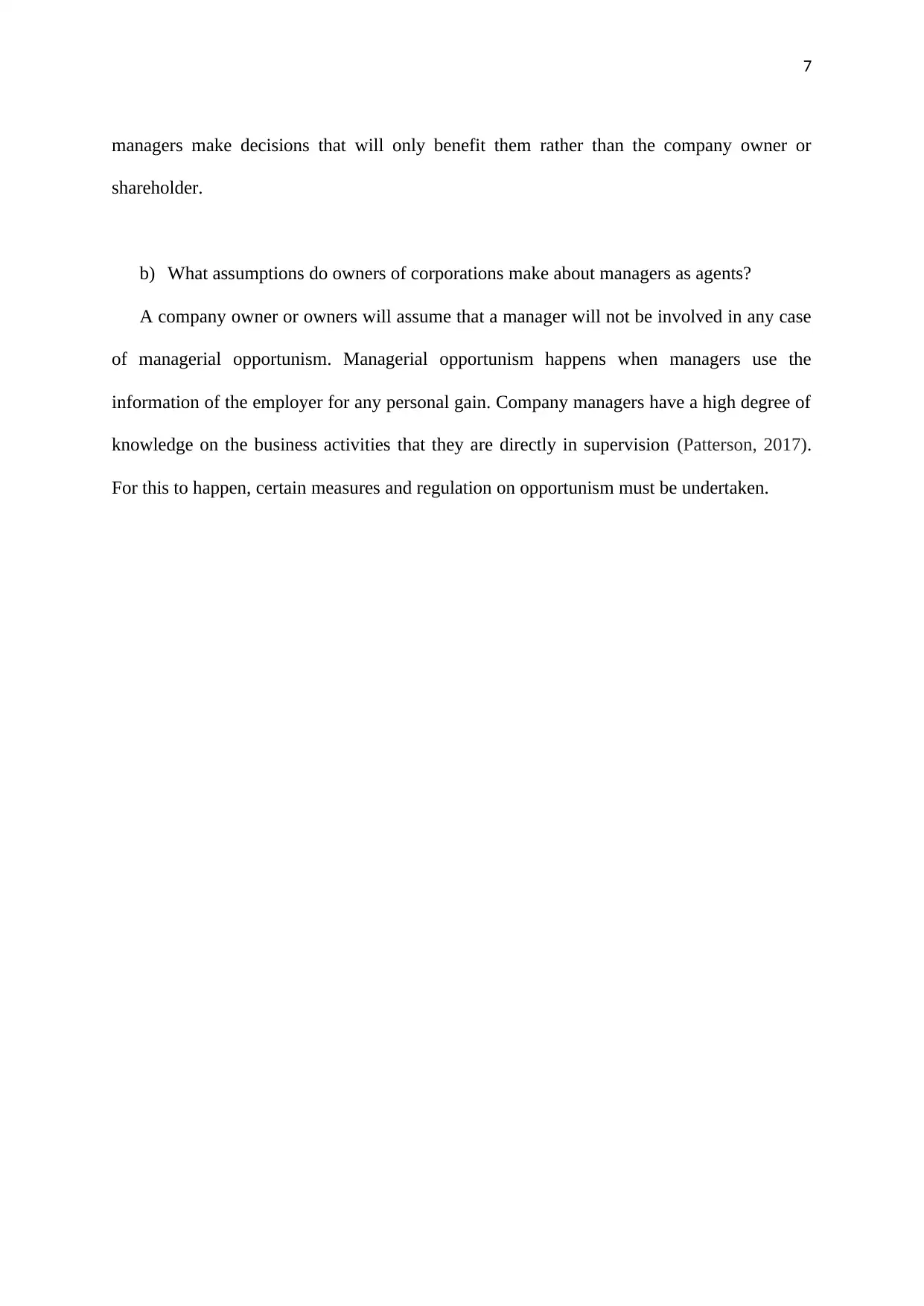
7
managers make decisions that will only benefit them rather than the company owner or
shareholder.
b) What assumptions do owners of corporations make about managers as agents?
A company owner or owners will assume that a manager will not be involved in any case
of managerial opportunism. Managerial opportunism happens when managers use the
information of the employer for any personal gain. Company managers have a high degree of
knowledge on the business activities that they are directly in supervision (Patterson, 2017).
For this to happen, certain measures and regulation on opportunism must be undertaken.
managers make decisions that will only benefit them rather than the company owner or
shareholder.
b) What assumptions do owners of corporations make about managers as agents?
A company owner or owners will assume that a manager will not be involved in any case
of managerial opportunism. Managerial opportunism happens when managers use the
information of the employer for any personal gain. Company managers have a high degree of
knowledge on the business activities that they are directly in supervision (Patterson, 2017).
For this to happen, certain measures and regulation on opportunism must be undertaken.
Paraphrase This Document
Need a fresh take? Get an instant paraphrase of this document with our AI Paraphraser
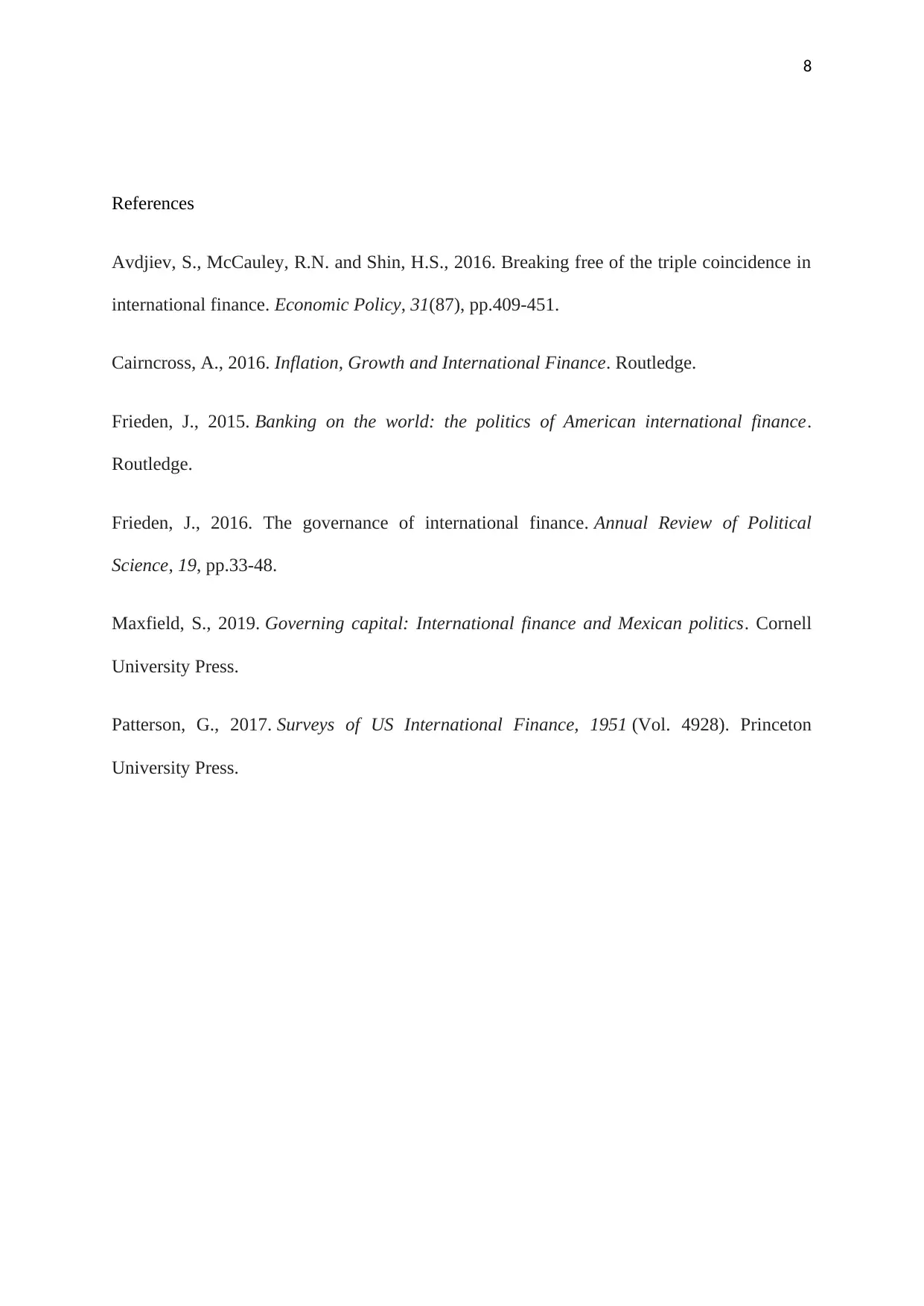
8
References
Avdjiev, S., McCauley, R.N. and Shin, H.S., 2016. Breaking free of the triple coincidence in
international finance. Economic Policy, 31(87), pp.409-451.
Cairncross, A., 2016. Inflation, Growth and International Finance. Routledge.
Frieden, J., 2015. Banking on the world: the politics of American international finance.
Routledge.
Frieden, J., 2016. The governance of international finance. Annual Review of Political
Science, 19, pp.33-48.
Maxfield, S., 2019. Governing capital: International finance and Mexican politics. Cornell
University Press.
Patterson, G., 2017. Surveys of US International Finance, 1951 (Vol. 4928). Princeton
University Press.
References
Avdjiev, S., McCauley, R.N. and Shin, H.S., 2016. Breaking free of the triple coincidence in
international finance. Economic Policy, 31(87), pp.409-451.
Cairncross, A., 2016. Inflation, Growth and International Finance. Routledge.
Frieden, J., 2015. Banking on the world: the politics of American international finance.
Routledge.
Frieden, J., 2016. The governance of international finance. Annual Review of Political
Science, 19, pp.33-48.
Maxfield, S., 2019. Governing capital: International finance and Mexican politics. Cornell
University Press.
Patterson, G., 2017. Surveys of US International Finance, 1951 (Vol. 4928). Princeton
University Press.

9
⊘ This is a preview!⊘
Do you want full access?
Subscribe today to unlock all pages.

Trusted by 1+ million students worldwide
1 out of 9
Related Documents
Your All-in-One AI-Powered Toolkit for Academic Success.
+13062052269
info@desklib.com
Available 24*7 on WhatsApp / Email
![[object Object]](/_next/static/media/star-bottom.7253800d.svg)
Unlock your academic potential
Copyright © 2020–2026 A2Z Services. All Rights Reserved. Developed and managed by ZUCOL.





